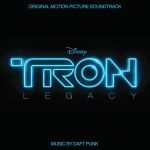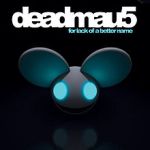This playlist features electronic, dance and techno music. Enjoy!
“The Game Has Changed” is the name of one of the tracks on Daft Punk’s score to Tron: Legacy, and it also fits Thomas Bangalter and Guy-Manuel de Homem-Christo’s music for the film. When it was announced that the duo would score the sequel to one of sci-fi’s most visionary movies, it seemed like the perfect fit: Their sleek, neon-tipped, playful aesthetic springs from their love of late-‘70s and early-‘80s pop culture artifacts like Tron. However, Tron: Legacy takes a much darker, more serious approach than the original film and Daft Punk follows suit, delivering soaring and ominous pieces that sound more like modern classical music than any laser tag-meets-roller disco fantasies fans may have had. “Derezzed”’s filter-disco and “End of the Line,” evoke ‘80s video games. – All Music Guide
Born Joel Zimmerman on January 5, 1981, Deadmau5 rose to prominence when his track “Faxing Berlin” found its way onto the playlist of legendary DJ/producer Pete Tong’s radio show. Deadmau5 soon became an important figure in the world of progressive house music, with his songs appearing on more than 15 compilation releases. A native of Toronto, Canada, he released his work through his own label, Mau5trap Recordings, and scored a number of awards in 2008, including a Juno Award for Dance Recording of the Year. He released Random Album Title that same year, along with the first volume of the remix-collecting At PLay series. The year 2009 saw the release of the singles collection It Sounds Like along with the mix album For Lack of a Better Name, while the studio album 4 X 4 + 12 followed in 2010. -All Music Guide
Das Spiegal/ The Chemical Brothers
The first half of the record, including the single “Do It Again” (unconsciously ironic title?), is no better nor worse than most of what The Chemical Brothers produced between 1998 and 2007, but beginning with a diverting little electro noodling called “Das Spiegel,” it becomes clear that there’s a little more going on here. Hip-hop’s favorite toker, Fatlip, stops by to relate an odd tale about fish (“The Salmon Dance”), “A Modern Midnight Conversation” dabbles in Italo-disco (but gets most of its flavor from a sample), and the duo stretch out (slightly) for the creepy four-four crawl “Battle Scars” with neo-folkie Willy Mason. The Chemical Brothers have occasionally shrouded their more interesting productions until the second half of their LPs, but something else is obviously needed.- All Music Guide
Drown in the now/ The Crystal Method
The Crystal Method have gradually shed the glossy big-beat techno that made their name in the late ’90s as one of the few mainstream American answers to the Chemical Brothers and Daft Punk, and they’ve also matured as producers, which has resulted in better albums (but fewer dancefloor-filling singles). They may still grab influences from the best in ’90s dance music, but they’ve become increasingly adept at constructing albums with more ideas (and subtlety) than the usual dance act. Matisyahu makes “Drown in the Now” moderately fresh, and the longtime L.A. man about town Justin Warfield attempts to channel Phil Oakey on the future shock “Kling to the Wreckage,” but these are yet more danceable electronica of the paint-by-numbers variety. – All Music Guide
Underworld didn’t become one of the biggest groups in the dance world by sitting in the studio all day, spending as much time making tea as producing tracks. Between records, the trio toured incessantly — playing rock venues, dance floors, major festivals all over the world — and consistently made the single best case for techno working in a live (as opposed to club) context. And just like their studio LPs, this one works so well, not just because the tracks are so excellently produced, but because Underworld is so good at placing sympathetic tracks next to each other and creating effortless-sounding transitions. -All Music Guide
Twenty years after England’s Summer of Love, rave had made a comeback — at least in indie circles — and Liam Howlett’s Prodigy, the only original rave group still going, could hardly have done worse than jump aboard. But Invaders Must Die is a curious nu-rave record, as though the sound of 1991 (such as their Top Ten hit “Charly”) has been filtered through the sound of 1996 (such as their number one, “Firestarter”) to emerge as nothing more than a hodgepodge of uptempo dance music with extroverted beats and grimy bass lines. If that sounds basically like your average electronica record circa the turn of the millennium (albeit produced by one of its greatest heroes), then you’re a long way towards understanding what this nu-rave record from the Prodigy sounds like.- All Music Guide
Crystal Castles’ self-titled debut helped take 8-bit synth tones into the mainstream. That jagged, strangely naïve sound of old-school video games is so distinctive that it could easily define the duo’s music instead of vice versa, but Ethan Kath and Alice Glass avoid that trap on their second, also self-titled album. Though 8-bit synths aren’t as prominent here as they were on the band’s earlier work, Crystal Castles still love repurposing seemingly obsolete and unfashionable sounds: “Baptism”’s brassy blasts hark back to at least the early ‘90s. – All Music Guide
Nominated for five Grammy Awards, shortlisted for the prestigious BBC Sound of 2012 poll, and courted by everyone from Chicago producer Kaskade to metal icons Korn, former From First to Last frontman Sonny Moore’s transition from post-hardcore vocalist to dubstep producer couldn’t have realistically gone any smoother. However, despite his unprecedented success, there’s still a question as to whether he can apply his now trademark, demonic, wobble bass drops and thumping syncopated beats to a whole album. Named after the battle cry of the lost boys in Steven Spielberg’s Hook, his fourth consecutive EP Bangarang (also his first Top 40 entry in both the U.K. and U.S.) suggests he’ll have to be on his game on the forthcoming full-length Voltage if he’s to avoid an Emperor’s New Clothes scenario.-All Music Guide
Ready Steady Go/ Paul Oakenfold
With a new partner, Andy Gray, Oakenfold shows often that he has the production gloss all taken care of, but track after track here tries, and fails, to capitalize on a familiar sound or a style, from stylish big-beat pastiche (“Ready Steady Go”) to robotic experimentalism à la Radiohead to evocative female singer/songwriter electronica.- All Music Guide
Following a notorious flirtation with alternative rock, Moby returned to the electronic dance mainstream on the 1997 album I Like to Score. With 1999’s Play, he made yet another leap back toward the electronica base that had passed him by during the mid-’90s. The first two tracks, “Honey” and “Find My Baby,” weave short blues or gospel vocal samples around rather disinterested breakbeat techno. “South Side” is just another pop song by someone who shouldn’t be singing — that is, until the transcendent chorus redeems everything. Surprisingly, many of Moby’s vocal tracks are highlights; he has an unerring sense of how to frame his fragile vocals with sympathetic productions. -All Music Guide
Emotional Technology is no great departure from the cinematic landscape of Brian Transeau’s excellent last album, the diverse Movement in Still Life. Keeping with that album’s attention to detail and seamless flow from track to track, Emotional Technology differs by being more ambitious, personal, and in the end a bit less satisfying. The electro-slap of Hybrid comes to mind on the Guru-guesting “Knowledge of Self,” the video game noises and solid rock & roll of “Superfabulous” is mega-uplifting, and “Somnambulist” almost equals “Never Gonna Come Back Down” for pop-trance perfection. -All Music Guide
Techno’s best albums act finally gets their very own singles collection, though the results fall just short of displaying the brilliance and grandeur of Orbital’s decade of great work. Fortunately, about 75 percent of Work 1989-2002 turns out exactly as it should: great versions of their best material, including their 1990 breakout “Chime” and the parade of excellent singles like “Halcyon and On and On,” “Lush,” “Belfast,” “Impact,” and “Are We Here?.” A few of these are present in drastically shortened 7″ versions, but that’s to be expected. Far, far worse is the focus on latter-day material like “Iluminate” and “Funny Break,” or the version on offer of the seminal “Satan” — instead of the 1990 original, the one here was taken from the Spawn soundtrack. – All Music Guide















 Posted by arts
Posted by arts 